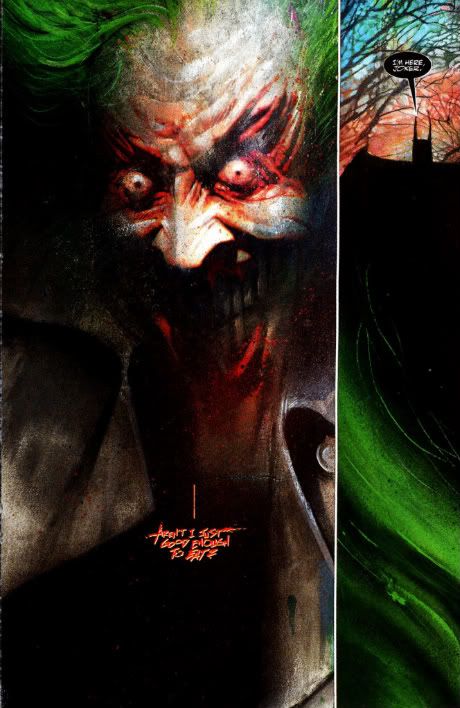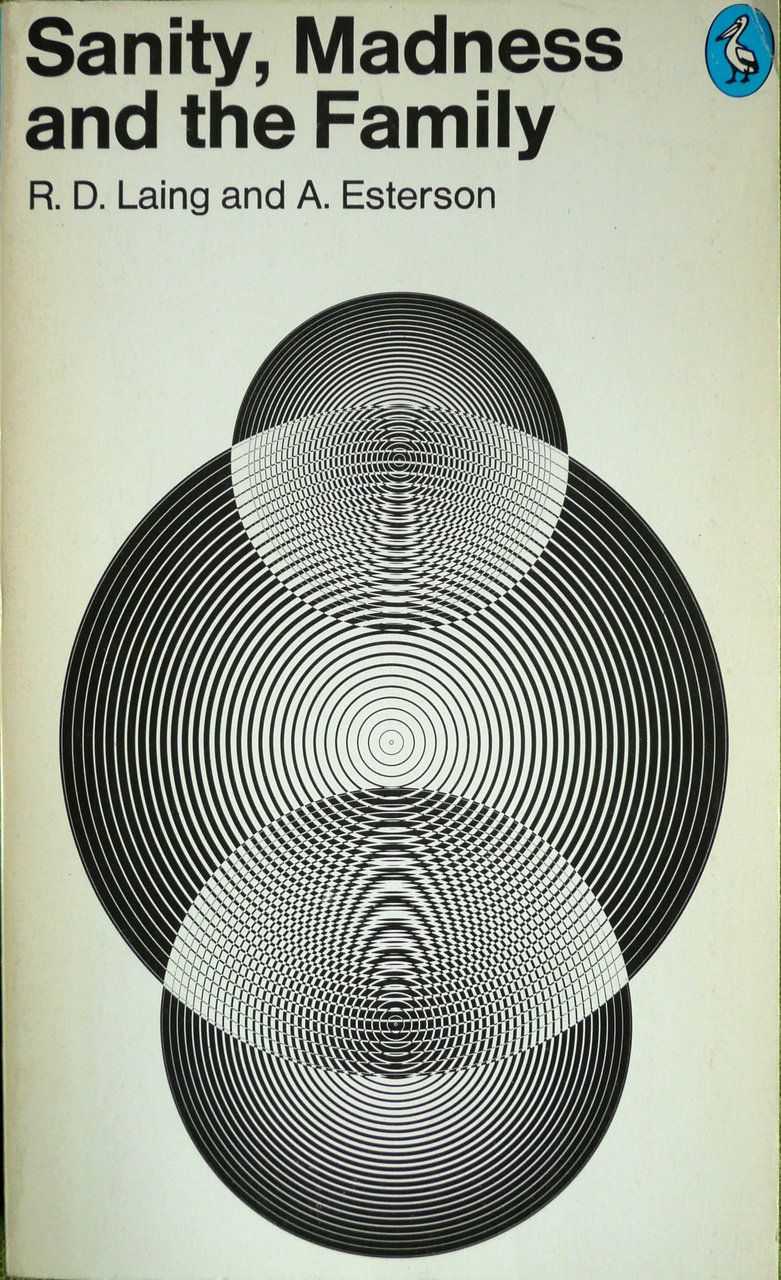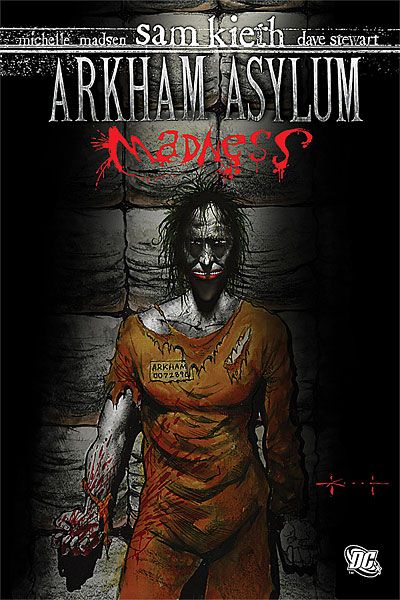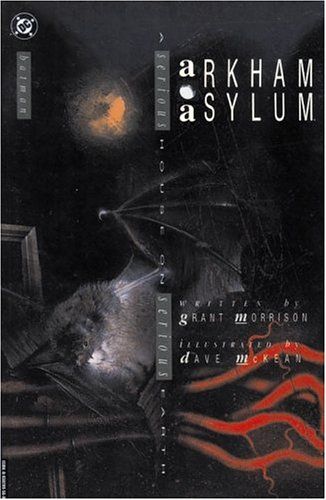At some point Arkham Asylum became an archetype. Within the comic book world, it provides a uniquely consistent space to explore the facets of madness. Creating art that can communicate and explore the unique logic of the insane is an impressive thing. Through this seemingly innocuous medium, the device of Arkham Asylum offers us myriad opportunities to explore the human psyche.
The isolating aspects of madness seem particularly heartbreaking to me. I used to love the work of Vincent Van Gogh, who found a way out of his isolation through his art, and left a legacy which still speaks to us today. He inhabited his own reality, and his perception of the world was so unique and unacceptable to everyone else that he was unable to function in their world. It is a tragic and horrible idea, one which simultaneously frightens and fascinates. Without art and literature, we're all doomed to live in our own heads. We each experience the world through our own eyes, with only the inadequate tool of language to share our reality. There is such a fine line between the uniqueness of human perception, and the isolation of a distorted view of reality (which can be experienced as madness.) When does a person cross this line? How does it feel? How do they react and respond?
It disturbs me to acknowledge that I don't know when I became fascinated by the concept of insanity. Trying to trace this path is impossible, it's always been enthralling. Perhaps this is partly because it is such a subjective concept. What constitutes madness is not a constant over time, it has changed greatly, and it's essential to acknowledge what this means in the context of who we are as a society. The way we define our insane says a hell of a lot about who we are as a society.
There is a book of case studies from the 1960's by Laing and Esterson called Sanity, Madness and the Family. Without any interjection, the conversations of families and their schizophrenic children are recorded. That is all, there is no commentary, nor conclusion, it is left to the reader to interpret these conversations which are, in many cases, rather ordinary. These are young women, committed to mental institutions for their own safety, but in truth it is the dynamics of their families that has created this so-called insane behavior. In our current society, a western family would be hard-pressed to exert so much control over their daughter, yet only 50 years ago, a young woman's refusal to marry or buy into the nuclear family values could be seriously interpreted as a symptom of madness. Similarly, 300 hundred years ago, a happily single adult woman could be suspected of witchcraft, and drowned or burned for her crime.
Madness is fluid, and our definition of it is doubly so. This might be part of why I find the concept of Arkham Asylum to be so stimulating. Here we have the creation, almost incidentally, of an archetypal mental institution within the superhero comic book universe. Batman might be the only comic book to consistently deal with madness in such an upfront way. Arkham Asylum offers writes a tremendous opportunity to examine and explore our own attitudes to madness within the relative safety of a medium that is popular and non-threatening.
Last week saw the publication of a new addition to the family of books to focus on this institution. Sam Kieth's Arkham Asylum: Madness has a title which promises to examine the issue at the heart of the matter. With Kieth's stint of the Maxx showing his willingness to delve into the arena of the potentially surreal universe which the mad live in, I approached this book with much anticipation.
Kieth's art is up to the task, showing a broad range of styles. Brighter colors and a cartooney simplicity convey moments of sweetness and joy, progressing all the way across the board to a much dirtier, scratching, complex style for the depiction of the mad and dangerous. The air of heavy misery and madness at it's most destructive is well depicted. However, there is a lack of intricacy or depth to the story, and certainly it misses layers to the language and story which the subject matter clearly deserves. While I'm happy to have read this book, like most books about Arkham Asylum and its inhabitants, it's a cowardly peek in the door at madness, rather than the plunge into the murky waters that Arkham offers.
In 1989 I read Grant Morrison and Dave McKean's Arkham Asylum. Unfortunately (for all the comic book creators following them) they set the bar outrageously high. Referencing myriad points in the pantheon of our approaches and attitudes to madness over time, hinting at a depth and horror that has never been managed since. This is 21 years ago now, and I'd say that Morrison's writing has grown immensely over time, however, he wrote with ambition and in this instance, he applied it judiciously. He elaborated on the Batman mythology in ways that are still felt today. The concept of madness is so fluid and subjective that at different times in our evolution, various behavior which we now consider to be entirely rational was considered to be a symptom of insanity. Morrison and McKean's book is the only one which has been sophisticated enough to convey that. There have been many others in the years since, but none have fully mined the potential of this aspect Batman's world.
Once upon a time someone casually posited that Batman's foes were insane, and went to an asylum. We have those writers to thank for this opportunity to explore the concept of madness, and at some point, this is a concept that will be explored in more depth. Grant drew us a map, now the task is to see where brave explorers can go with it. Personally, I have yet to see anyone take it further than this book, but that means nothing. I've got the long view here, and comic book archetypes last a long time. Societal values change all the time and over time, what is considered commercial and acceptable will change. One day, when people want to explore what madness means in their era, pop culture is one of the first places that popular interests are explored, and people will have this fantastic trope to explore madness through the device of fiction.





